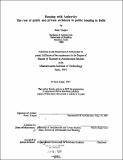Housing with authority : the role of public and private architects in public housing in Delhi
Author(s)
Gupta, Soni
DownloadFull printable version (13.05Mb)
Alternative title
Role of public and private architects in public housing in Delhi
Other Contributors
Massachusetts Institute of Technology. Dept. of Architecture.
Advisor
John deMonchaux.
Terms of use
Metadata
Show full item recordAbstract
The main concern of this thesis is the role of the architect in the design and production of public housing. The argument presented here is that the method of procurement of architectural skills affects the architectural quality of the product, and that architectural design is driven by more than professional 'idealism'. The case studies that form the basis for the discussion are two middle income housing projects built by the Delhi Development Authority (DDA). One was designed in-house by DDA architects and the second by a private architect. Working within similar constraints of economy, bureaucratic requirements and time, the results produced were very different. On the basis of the difference in architectural quality, I analyze the methods of procurement of architectural skills, for both the private and the in-house architect. The issues that were raised by the case studies as being the part of the process of procurement were categorized into four broad areas: (i) The DDA and its administration of architectural skills; (ii) the nature of housing as the product; (iii) the nature of the professional establishments; and (iv) the architects, themselves as professionals. The process of procuring architectural skills had implications on the architect's performance and his response to design issues. Thus, the qualities of livability, efficiency of land use and aesthetic design that were present in one project and not in the other were linked to the fragmentation of work in the professional system, the manner in which compensation for work was made, the nature of the project itself, in terms of visibility. They also had to do with the staffing of the architectural offices and the research carried out by them. Rather than make normative judgements about the quality of the projects, this thesis questions the appropriateness of the decisions made by the architects in both cases and highlights the issues that lay behind them.
Description
Thesis (M.S.)--Massachusetts Institute of Technology, Dept. of Architecture, 1991. Includes bibliographical references (p. 99-103).
Date issued
1991Department
Massachusetts Institute of Technology. Department of ArchitecturePublisher
Massachusetts Institute of Technology
Keywords
Architecture.